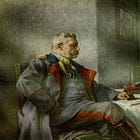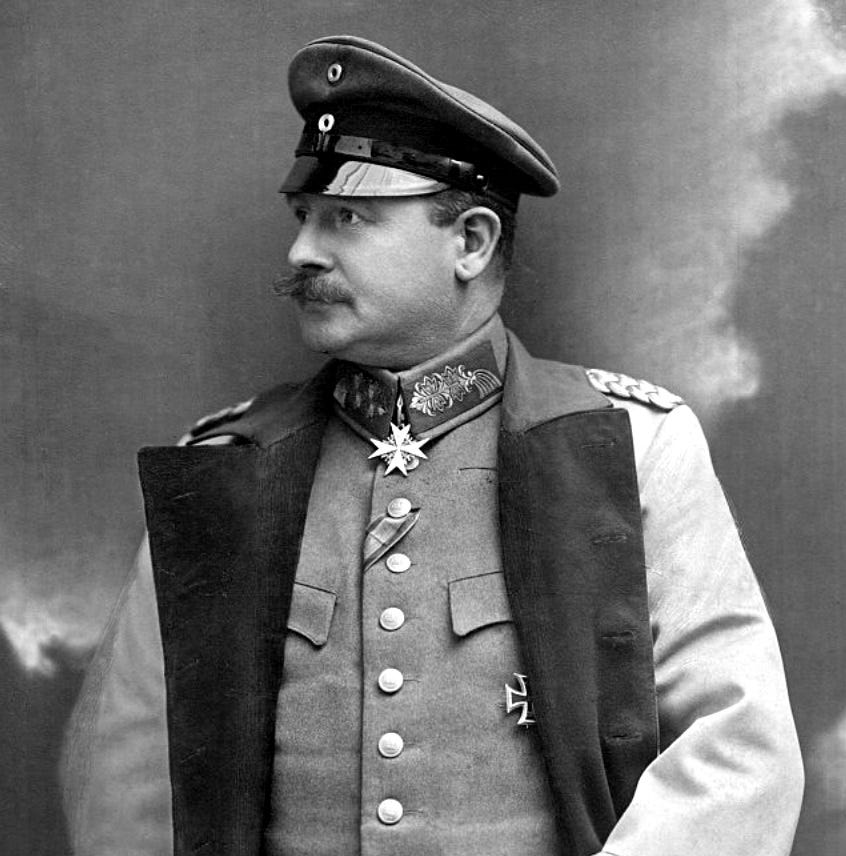This post is part of a long series. To read the parts that precede it, and those that follow, please use the following display link.
Field Marshal Count Moltke, Count Schlieffen, and the World War
Georg Wetzell
(Continued)
I would like to demonstrate the soundness of this logic, with regard to 'modern conduct of war,' by referring to the German operations at the beginning of the War. Knowing Ludendorff as I do, I am certain that he would have acted as I now propose, if he had been placed whee he belonged in 1914, in the position of principal adviser to the Chief of Staff of the Field Forces.
The concentration is known. It was not complete when the responsible commander, Colonel General von Moltke, Chief of Staff of the Field Forces, and G.H.Q. departed from Berlin, August 16. Intelligence concerning the French armies, up to the 15th, clearly revealed that superior French forces were marching through the country bounded by the Vosges Mountains and the Moselle, leading north towards and across the frontier; other forces were reported to be pushing forward along the west bank of the Moselle, in the direction of the Belgian frontier.
It was not known whether and to what extent the western flank of the French armies extended beyond the Meuse. There were no reports of any French reinforcements moving in support of the Belgian Army which apparently was retiring to Antwerp, nor of any debarkation or arrival of British troops. In other words, the hostile disposition was taking shape as assumed in the operations plan of 1914 (strong German forces in Alsace-Lorraine).
At any rate, the hostile situation was extremely favorable for the German High Command to gain a swift decision on the Western Front. Schlieffen had called such a situation a 'lover’s service' [Liebesgabe] on the part of the opponent.
The breakwater created by the triangle of the fortress of Metz, the fortress of Diedenhofen, and the Nied River had split the French armies into two widely separated groups. This was a direct invitation to the German commander to resort to a corresponding 'strategic expedient'. The question now was whether the responsible commander should follow in the footsteps of the great Moltke and Napoleon and, in conformity with an expression of Ludendorff, exploit the obvious 'weakness of the opponent’, created by the division of his forces, and strike a blow which might decide the issue of the entire war.
Almost one-half of the French forces were engaged in the invasion of Alsace-Lorraine. The defeat and repulsion of those forces against the Vosges Mountains and the German Rhine would have meant the fulfillment of one-half of the great idea which Schlieffen had incorporated in his operations plan of 1905.
Facing an entirely different situation in those years (the French Army on the strategic defensive behind its fortresses), Schlieffen had intended to execute a wide envelopment on French soil and drive the French Army against the Swiss border. Ludendorff is of the opinion that the entire situation on the Western Front in this manner could have been decided in our favor at the very outset of the War.
Another decisive blow could then have been struck in the region between the Meuse and Moselle, regardless of whether the French left flank extended beyond the Meuse or not, for the other half of the attacking French armies was bound to be in that area.
So much for the situation. Of course, it required a flexible conformation to the hostile disposition, an abandonment of the old idea inherited from Schlieffen, to march through Belgium and conduct an enveloping operation in the direction of Paris. Briefly, it called for immediate and energetic action on the part of the High Command.
For a while General von Moltke occupied himself with this very natural thought (see Fourth and Fifth Army Orders, August 14), but he finally permitted the chief of the operations section [Gerhard Tappen], who considered the 'plan' above everything, to change his mind to the detriment of the entire course of the war. The best indication of what should have been done now is furnished by Schlieffen’s staff rides of 1904 and 1905, on which General von Moltke and Ludendorff accompanied him.*
*The dogmatists of Schlieffen, above all [Wilhelm] Groener, invariably base their postwar doctrines on the failure, in 1914, to execute the Schlieffen Plan of 1905 which, as Ludendorff has already stated, emanated from an entirely different disposition of the opposing forces. These dogmatists completely forget the staff rides of Count Schlieffen; they are far more important for the practical execution of a high command, for it was on those staff rides that Schlieffen assumed the situation which actually prevailed in 1914. It is time that we alter our views in evaluating the great strategist.











